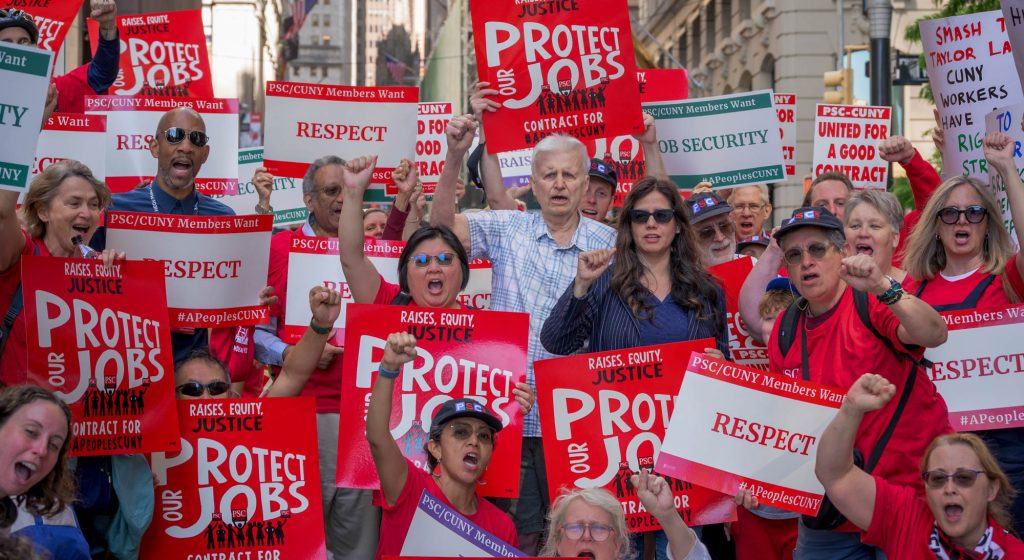
PSC members rally outside of CUNY Board of Trustees Chair William Thompson’s Wall Street office. (Credit: Erik McGregor)
More than 60 PSC members gathered in Lower Manhattan on June 28 to tell CUNY Board of Trustees Chair William Thompson that CUNY must get serious about settling a contract.
The PSC had gathered outside the offices of Siebert Williams Shank, the financial firm where Thompson – the former city comptroller and Democratic Party mayoral candidate – currently serves as partner. The union, PSC President James Davis told the crowd, had now held nearly two dozen bargaining sessions with management since the contract expired more than a year ago.
LONG STRUGGLE
It has been a hard struggle to fight CUNY’s draconian demands that would diminish job security and impose inadequate wages onto a workforce that has already been cut to the bone.
“We have managed to move CUNY management, and we have moved them because of actions like this,” Davis said during the morning picket. “CUNY still has a bunch of garbage demands and proposals on the table.”
The union has staged many different actions to push CUNY management. Just weeks before, more than 100 members filled a Board of Trustees meeting at Bronx Community College, where Davis interrupted the meeting to demand real movement on the contract, leading chanting members out of the room in a show of force. Over the course of the last few months, the union has been able to beat back inadequate wage demands and other issues. But there is more work to be done, the president said.
“Your pressure has already been working,” Davis told members, noting that CUNY management has had to back off some of its worst demands. “But they have not moved enough.”
But CUNY has stalled talks over the summer. At the time of the rally, management had only agreed to one bargaining date over the break. The union is still fighting management on several key issues including real pay, job protections and faculty governance.
Above all, PSC members want wages that keep up with inflation and bring CUNY faculty and staff more in line with the pay their colleagues at peer institutions receive. CUNY management have come off as pennypinchers when it comes to faculty and staff, and freewheeling spenders when it comes to management. The New York Post reported in June that the trustees “approved an eye-popping $320,681 salary for Gayle Horwitz, who was elevated to senior vice chancellor as well as secretary to the board,” a figure that “far exceeds the $250,000 salary for Gov. Kathy Hochul and $258,000 compensation for Mayor Eric Adams.” The paper added, “Horwitz, who has held top posts at CUNY since 2016, saw her salary jump from $267,628 – a 16% increase, records show.”
This injustice at CUNY has fueled much of the member outrage this summer, much of which was on display outside of Thompson’s office.
“While Bill Thompson is serving his wealthy clients, he is not serving the city of New York or meeting the needs of CUNY students and CUNY workers,” PSC secretary Andrea Vásquez said during the picket.
ATTENDING SESSIONS
Over the summer, dozens of members continued to attend bargaining sessions between CUNY and the PSC. The inclusion of member observers has been central to the union’s strategy – the openness allows members to learn about and be involved in the process as well as show CUNY that rank-and-file members are united behind the PSC’s doable and reasonable contract demands. The PSC and CUNY are slated to meet several more times in August for bargaining.
Daniel Casey, a CLIP instructor at Hostos Community College, has attended several bargaining sessions over the last year.
“We try to have at least one CLIP or CUNY Start instructor observing every bargaining session, ready to help with information during the caucus break, and to suggest talking points or rebuttals,” he said. “At the outset, the CUNY bargaining team knew very little about our programs. For CLIP and CUNY Start, as with other job titles, the PSC has had to educate management before we could even begin to negotiate with them.”
PSC IS FIGHTING
He added, “Several members of the PSC bargaining team are knowledgeable and tenacious advocates for CLIP and CUNY Start. We appreciate their perseverance very much. While observing bargaining sessions, I have learned a great deal about other job titles, and this has strengthened my sense of solidarity with fellow PSC members. Collective bargaining is enormously beneficial. Thanks to gains made in previous contract campaigns, my family has enjoyed substantial improvements in our quality of life. The importance of health insurance cannot be overstated, of course, but we are not just paying the bills anymore. We are saving money for our children’s college educations.”
Rochelle Spencer, a lecturer in English at LaGuardia Community College, was also inspired by observing a bargaining session. She said that the union “has made strong, carefully calibrated arguments; however, we must place more pressure on the CUNY administration. Attending bargaining sessions makes the administration aware that we care.”
Published: August 5, 2024

